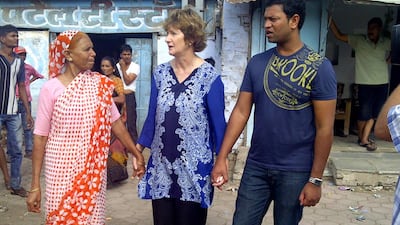Dishevelled hair, a faded tracksuit and squeaky flip-flops point at someone who’s laid-back. But the 33-year-old Saroo Brierley, an Indian-born Australian who used satellite images to find his mother from whom he was separated when he was 5 years old, is anything but.
“I’m a role model for those torn apart from their families during dangerous times like civil war or invasion and want to be reunited with their loved ones when things stabilise,” says Brierley, who runs a marine-gear retail business in Hobart, Tasmania. “My story sounds like a miracle but it’s doable.”
Brierley's recently released autobiography A Long Way Home recounts how he used Google Earth and childhood memories to track down his village and family in India after a 25-year separation. The book hit the stands in Australia in June last year; the Indian edition appeared in October. It will be released in the United States this month and in Europe later this year.
While chatting in the lobby of the Taj Bengal hotel in Calcutta, Brierley’s bohemian appearance draws glances from guests milling about in dark suits, but he is unfazed.
Born to a poor Muslim family in the village of Ganesh Talai, near Khandwa in the Indian state of Madhya Pradesh, he was 5 and was begging when he got on a train at the Khandwa railway station and dozed off. He woke up 14 hours later in Kolkata. A policeman took the lost boy to an orphanage called Nav Jivan (New Life), from where he was adopted by an Australian couple in 1987.
The businessman John Brierley and Sue brought him up with great affection in Hobart, and the young Saroo grew up to be “an average student but excelled in sports”.
“In India, I was absolutely unlettered. I did not know the name of my village or nearby towns. Of course, I had vivid memories. I also missed my family terribly, particularly my mother. In college in Canberra, my friends tried their best to help me locate my birth place but they failed.
“Finally, I drew a circle [on a map] with its centre in Calcutta and the radius about the distance a train could cover in 14 hours. Using Google Earth, I spent long nights zooming in and zooming out, looking for something I recognised. I felt like Superman floating above the landscape and asking myself: ‘Does this match?’ The answer, invariably, was ‘no’.
“But one day I spotted a waterfall that I instantly recognised, and that’s how I zeroed in on Khandwa. I then joined a Khandwa Facebook group. With their help, I tracked down Ganesh Talai in February 2012, bought a ticket and combed its streets until I was standing outside my home – after 25 years of looking. When she first saw me, my mother thought I was a ghost.”
Brierley, who has remained in touch with his biological mother and sends her money regularly, says his adoptive parents supported him in his efforts to find his family and were pleased when he finally made contact with them.
Did the idea of giving up ever occur to him?
“If you persist, you will find a needle even in the world’s biggest haystack,” says Brierley. “The trick is to keep trying.”

